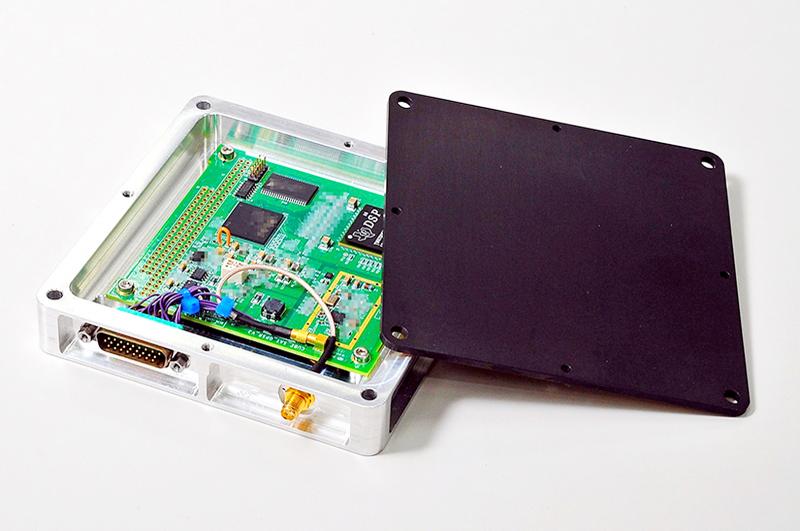Taiwan’s first locally made GPS receiver for satellite missions functioned normally and passed key environmental tests during nearly two months in space, raising hopes for the nation’s satellite development program.
The National Space Organization (NSPO) on Thursday said in a statement that the receiver, which it developed, was launched into space on a Taiwan-developed IRIS-A CubeSat on Jan. 14 and has since orbited 500km above the Earth’s surface.
The receiver has since operated normally and passed rigorous environmental tests, in the process gaining “flight heritage,” a term used to describe the situation when a technology works in a commercially representative environment, the NPSO said.

Photo: National Space Organization
The more flight heritage a space device accumulates, the more credibility and trust it builds, and the more commercially viable it becomes, but it can be hard for product developers to get their products into orbit.
The NPSO did that by hitching a ride on a cubesat — a miniature satellite used primarily for research. It teamed up with National Cheng Kung University, which developed the IRIS-A CubeSat, to get the GPS device into space.
The GPS receiver’s initial success represents a key step in the agency’s drive to develop and produce satellites with 70 percent of their components made in Taiwan, NSPO Director Wu Jong-shinn (吳宗信) said.
Taiwan has previously relied on foreign GPS receivers for its home-grown satellites, but that is changing, Wu said.
The GPS receiver is to be used in an NSPO-manufactured “wind-hunter” satellite, called the Triton, which is to be launched by the end of this year, as well as in Formosat-8 satellites and synthetic aperture radar satellites, he said.
The NPSO said that the GPS receiver would improve satellites’ ability to navigate and reduce the cost of satellite missions.

POSITIVE DEVELOPMENT: Japan and the US are expected to hold in-depth discussions on Taiwan-related issues during the meeting next month, Japanese sources said The holding of a Japan-US leaders’ meeting ahead of US President Donald Trump’s visit to China is positive news for Taiwan, former Japan-Taiwan Exchange Association representative Hiroyasu Izumi said yesterday. After the Liberal Democratic Party’s landslide victory in Japan’s House of Representatives election, Japanese Prime Minister Sanae Takaichi is scheduled to visit the US next month, where she is to meet with Trump ahead of the US president’s planned visit to China from March 31 to April 2 for a meeting with Chinese President Xi Jinping (習近平). Japan and the US are expected to hold in-depth discussions on Taiwan-related issues during the

‘LIKE-MINDED PARTNER’: Tako van Popta said it would be inappropriate to delay signing the deal with Taiwan because of China, adding he would promote the issue Canadian senators have stressed Taiwan’s importance for international trade and expressed enthusiasm for ensuring the Taiwan-Canada trade cooperation framework agreement is implemented this year. Representative to Canada Harry Tseng (曾厚仁) in an interview with the Central News Agency (CNA) said he was increasingly uneasy about Ottawa’s delays in signing the agreement, especially as Ottawa has warmed toward Beijing. There are “no negotiations left. Not only [is it] initialed, we have three versions of the text ready: English, French and Mandarin,” Tseng said. “That tells you how close we are to the final signature.” Tseng said that he hoped Canadian Prime Minister Mark Carney

President William Lai (賴清德) yesterday bestowed one of Taiwan’s highest honors on Saint Vincent and the Grenadines (SVG) Ambassador Andrea Clare Bowman in recognition of her contributions to bilateral ties. “By conferring the Order of Brilliant Star with Grand Cordon on Ambassador Bowman today, I want to sincerely thank her, on behalf of the Taiwanese people, for her outstanding contribution to deepening diplomatic ties between Taiwan and SVG,” Lai said at a ceremony held at the Presidential Office in Taipei. He noted that Bowman became SVG’s first ambassador to Taiwan in 2019 and

A man walks past elementary school artworks at the Taipei Lantern Festival in Ximen District yesterday, the first day of the event. The festival is to run from 5pm to 10pm through March 15.